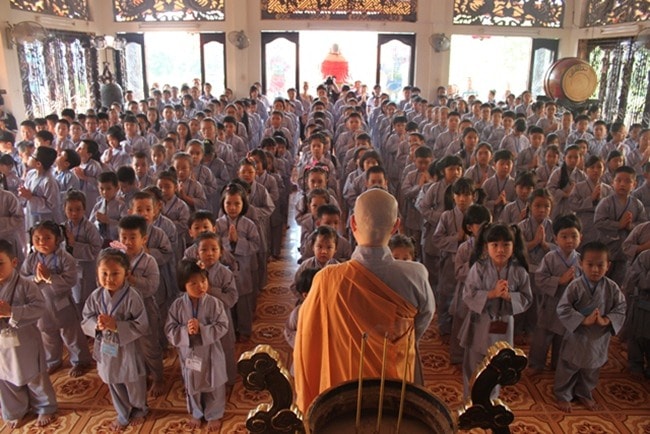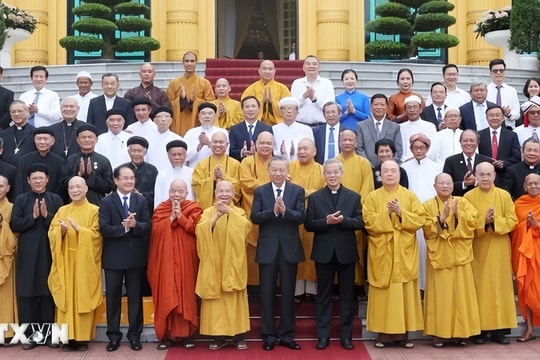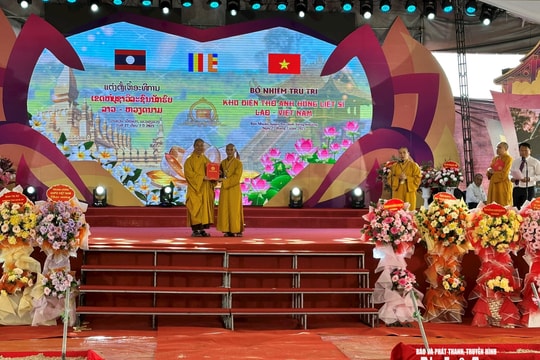The meaning of "Respecting teachers and valuing education" in Buddhism
(Baonghean.vn) - The Buddha said in the Anguttara Nikaya: "A skillful preacher brings peace to gods and humans, a poor preacher only brings suffering to all living beings."
In Buddhism, the meaning of "Respecting teachers and valuing education" is reminded by Buddha more through related teachings about gratitude and repaying kindness that a Buddhist must practice to bring about the ultimate blessings of peace and happiness in the life of practice.
 |
The word “Teacher” has been known as a sacred role of a third level in human life after father and mother. If parents give birth to and raise us to become adults, teachers are the ones who cultivate, build, transmit and equip us with basic and useful knowledge to prepare us for life.
The Teacher is considered as a second father in our life through the two sacred compound words “master” that we often hear mentioned when calling a teacher in Taoism. Master, master is teacher, father is father according to Sino-Vietnamese words.
Being both a teacher and a father is not an easy task for a person who has the responsibility of an educator. Because it involves both responsibilities that an educator must bring to his students, the spiritual children that he must wholeheartedly teach, care for, worry about and worry about.
The Buddha himself is a living image of the character, role and responsibility of a master towards his disciples. The Buddha was not only a teacher who guided his disciples on the path of holiness, but he was also extremely gentle and caring in caring for and protecting his disciples in their daily lives.
That extremely vivid image was seen in the Dhammapada Sutta number 41 when the Buddha personally boiled hot water to bathe and clean the festering, stinking, bloody body of Venerable Pūtigattatissa when he had leprosy, the festering, stinking sores made everyone fear and avoid him.
Not only did the Buddha not fear or avoid his disciples, he also kindly took off his robes, personally cleaned and washed the body of Venerable Pūtigattatissa, then personally changed his robes, changed the bedsheets, blankets and pillows for him while the other Bhikkhus took care of sweeping and cleaning the room to make it clean and airy.
After Venerable Pūtigattatissa was completely purified, the Buddha kindly sat down beside him, lovingly held his disciple's gnarled, rough and aged hand and taught him the concept of the dissolution of the body and guided Venerable Pūtigattatissa's mind onto the path of purity and cleanliness. Finally, before he breathed his last beside his revered teacher, Venerable Pūtigattatissa became a stainless Saint, an Arahant, completely pure and clean in both body and mind.
That is the heart and boundless love of a teacher, a father whom we often call master through the image and example of a Dharma king of the three realms, compassionate father of the four species like our Buddha.
 |
In the Sigàlovàda Sutta of the Dìgha Nikaya, the Buddha also taught the young Brahmin Singàlaka about the teacher's attitude towards his student and the student's attitude towards his teacher, corresponding to the southern worship as follows:
“Householder, there are five ways in which a disciple serves his teachers as the south: he rises to greet them, attends to them, is eager to learn, serves them himself, and is attentive to learning their profession. Householder, being served by his disciples as the south in these five ways, teachers have compassion for their disciples in five ways: they train them in what they have been well trained in; they teach them to maintain what they have been well maintained in; they teach them to master their professions; they praise them to their friends and acquaintances; they ensure their profession in all aspects. Householder, in these five ways teachers are served by their disciples as the south and teachers have compassion for their disciples. Thus the south is protected, becomes secure, and is free from fear.”
Thus, according to the spirit of this sutra, we see that the Buddha has stated the five duties of a teacher towards his students and vice versa, the students must also have five obligations towards their teachers in the most complete and perfect way to be considered worthy of being worshipped as worshipped in the South. Not only guiding and transmitting the methods of practice to purify the body and mind, but the teachers in the temple must also care for, protect, shelter and nurture their disciples with the responsibility of fathers and mothers.



.jpg)

.jpg)


